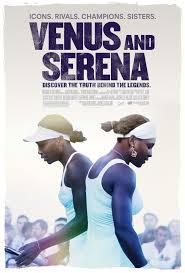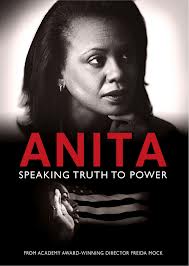In 1954 the United States Supreme Court literally opened the door for people of color to attend the same public schools as their white peers. In 1964 Congress further acted against discrimination by opening doors to the workplace, public accommodation, and voter registration. In 1965 it followed up by passing the Voting Rights Act of 1965.
In the fourth volume of his biography of LBJ, (The Passage of Power) Robert Caro describes in detail how Johnson, following the assassination of JFK, moved an ossified, entrenched Congress dominated by segregationist Southern Democrats to pass his Great Society package, reform the tax code, and, most significantly, push through the Civil Rights Act of 1964.
This week, two documentary films at the Seattle International Film Festival brought the Civil Rights Act back into focus for me. Although neither of the films addresses the legislation directly they do so obliquely. The films are Venus and Serena; a film about tennis’ Williams sisters and Anita, a look back at Anita Hill’s testimony in the 1991 Senate confirmation hearings for Clarence Thomas’ nomination to the Supreme Court.
 For those of us who were present during the civil rights era of the 1960’s and 70’s this is important territory to revisit and a reminder that though we have made monumental progress and can now proudly celebrate the election of an African-American President, issues of race and gender are still front and center in America’s dialogue with itself.
For those of us who were present during the civil rights era of the 1960’s and 70’s this is important territory to revisit and a reminder that though we have made monumental progress and can now proudly celebrate the election of an African-American President, issues of race and gender are still front and center in America’s dialogue with itself.
These films are about race and gender. None of the featured players is a groundbreaker in the sense that Jackie Robinson was in major league baseball. Althea Gibson broke the color barrier in women’s tennis in the mid-1950’s and Arthur Ashe did it on the men’s side in 1965. And, Clarence Thomas was not the first African-American Supreme Court nominee or appointee. Thurgood Marshall holds that distinction with his appointment to the court in 1965. But, the stories and the films tell intense and relevant stories about significant historical eras and events. The Williams sisters journey from a California ghetto to Wimbledon is a rags to riches family drama full of twists and turns that is still being played out on the world stage, and Anita Hill’s calm reflections on the Clarence Thomas confirmation hearings show us a woman of thoughtful integrity speaking truth to power whose life was changed because she stood up for what she believed and believed that Thomas did not meet the high standards for appointment to the Supreme Court. She came forward to testify because she believed that her testimony was important for the nation.
When it comes to tennis it is indisputable that the Williams sisters have raised the level of play on the women’s tour over the past 15 years. Venus, the older of the two, was the first to win a Grand Slam event and though plagued by health problems and injuries in recent years has continued to be an attractive and gracious person on and off the court. Sister Serena surpassed her sister in number of Grand Slam wins a few years ago and is unquestionably the most dominant figure in women’s tennis today – possibly the best woman player of all time. Her power and tenacity are legendary, but like some other champions (Conners and McEnroe come to mind) her take-no-prisoners approach has an ugly downside. She’s a snarky loser and not quite believable as a gracious winner. As a humorous aside in the film, Serena acknowledges her behavioral problems and blames a dark alter-ego she calls Taquande who takes over her persona. At least she has a sense of humor about it, although the referees and line-judges may not share the joke.
The dark side of the Williams sisters story is not Serena’s bad behavior; it’s their father, Richard, their first coach and the one who charted and managed their careers. He is greedy, devious, authoritarian, confrontational, racist, and, to me, thoroughly despicable. There is plenty of footage to document all of Richard’s flaws, but his daughters continue to honor and respect him which contributes to and promotes Richard’s claim that “it’s them against us.” It’s hard to watch but it’s part of the story.
On the other hand, Anita Hill, volunteering to testify comes under attack by 14 white US Senators, as if her character and credibility were the issue not Thomas’. She never faltered under the withering character attack during several days of testimony on the Thomas nomination. She was direct, forthright, and calm as she answered every question the Judiciary Committee asked, no matter how accusatory or demeaning. Everyone agrees that one of the principals – either Thomas or Hill – lied under oath. It was a classic case of “he said, she said” and no one but the two of them knows the the truth. In the end, the Judiciary Committee rejected Anita Hill’s testimony and declined to call four other witnesses who offered to testify about other instances of Thomas’ sexual harassment.
Was Clarence Thomas the most qualified candidate for the position of Associate Justice to the Supreme Court? The consensus is that he was not. In his 22 years as an Associate Justice he has rarely asked questions of counsel during oral argument, has a exhibited a worldview driven by revenge against “liberal elites” and has promoted a judicial philosophy that is more radically conservative than any in history. This Justice, whose education and career were supported and advanced by affirmative action now rejects the policy and believes that it hurts people of color because it places them in situations where they are doomed to fail. Self-assessment?
Imagine what a difference it would have made if George H.W. Bush, a middle of the road Republican President, had put forward a like-minded nominee instead of Thomas. In the last 22 years Thomas has been the most conservative of the 9 justices and the unswerving lynch-pin in conservative 5-4 decisions during his tenure. Ironically, many of those decisons have aided conservatives in rolling back the gains of LBJ’s Great Society and the Civil Rights Act. What would American jurisprudence look like today if a moderate had been elevated to the court in Thomas’ place. It’s difficult to know but it would surely be different.
Anita Hill left her tenured position at the University of Oklahoma Law School in 1997 and is now a Fellow at Brandeis University’s Heller School for Social Policy and Management.
The most personally provocative question raised by these films is not about the subjects but the intensity of my feelings about the villans. Is there a racist component to my dislike of Richard, Clarence and Serena? I have such negative feelings about both men and I find myself consistently rooting for Serena’s opponents. I don’t want to believe that there’s a racist component but I have to acknowledge that there may be. I hope that this awareness might at least help offset whatever unconscious prejudice is at work.
The Seattle International Film Festival is one of the largest and most widely attended events of its kind. I’m particularly attracted to the documentaries that may or may not come to theaters during the rest of the year. These two films, Venus and Serena and Anita, by respected filmmakers, were good entertainment but also help remind me of important social changes and personalities in my lifetime. Last night I was turned away from a sold out showing of Terms and Conditions May Apply another documentary at SIFF. This one is about the dark side of “free” services and the continuing disappearance of online privacy. It’s about what happens to your privacy when you check that little box that says “I Agree” at the bottom of the Facebook, Twitter or other internet sites. It’s a must see but it looks like I’ll have to wait until it comes around in general release. Got to keep showing up; there’s good stuff out there.

































I think you are too hard on yourself Jack. If I root for Serena’s opponent it’s only because that person is the underdog fighting one hell of a tough cookie. I bet that’s the case with you, but you’re not conscious of it.
I’m writing this from Heathrow, so pat yourself on the back for having an international following.
Walt